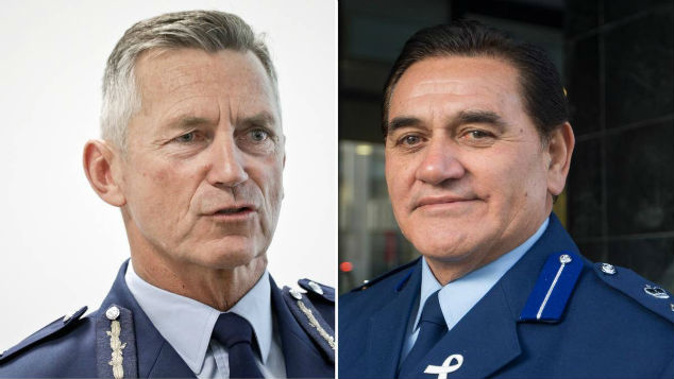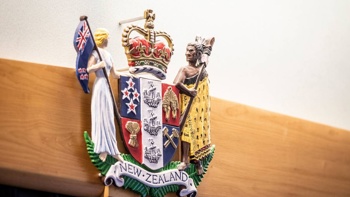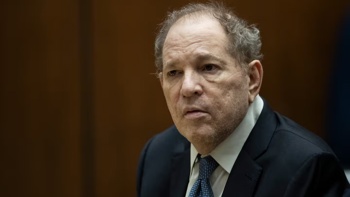
Police Commissioner Mike Bush was warned by his right-hand man about Wally Haumaha's history with the disgraced officers at the centre of rape allegations which rocked the police force, according to Herald sources.
Deputy Commissioner Mike Clement was second-in-charge of Operation Austin and his "attention to detail" was later credited with rape convictions being secured against Brad Shipton and Bob Schollum.
Clement met Louise Nicholas - whose allegations led to Operation Austin and a Commission of Inquiry into police culture - to canvas her thoughts about Wally Haumaha being promoted to Assistant Commissioner last year.
She had read Haumaha's statement to the inquiry team where he described Shipton as a "big softie" and Schollum as a "legend" with women and was opposed to him rising into the upper echelons of the police executive.
One officer told the 2004 investigation into the police sex allegations that Haumaha described Nicholas' allegations as "a nonsense" and that "nothing really happened and we have to stick together".
Sources have told the Herald that Clement - who graduated from Police College with Bush - warned the Commissioner about Haumaha and the potential risk to the reputation of police if he was promoted.
The details of the private conversation are unclear. But Clement remains in close contact with complainants in Operation Austin, particularly Nicholas, and has strived to change police culture since the Commission of Inquiry.
It is unclear whether Clement spoke again to Bush about Haumaha ahead of his appointment as deputy commissioner, just 12 months after his previous promotion.
/arc-anglerfish-syd-prod-nzme.s3.amazonaws.com/public/P4LBLNOIHJGZZFQFCWPZCBIET4.jpg)
Mike Clement. (Photo / NZ Herald)
Bush was on the State Services Commission panel which recommended Haumaha as one of two preferred candidates for the deputy commissioner role which became vacant last month.
In turn, Police Minister Stuart Nash chose Haumaha as the recommendation to be signed off by the Prime Minister Jacinda Ardern, then officially sworn in by the Governor-General.
When the Herald reported Haumaha's comments last month, Nash described them as "deeply disappointing" and "unacceptable".
Nash said he and Bush was unaware of the specific statements quoted.
"I don't think you could reasonably expect the Commissioner to know the comments Wally had made with regard to Operation Austin," said Nash.
The acting Prime Minister Winston Peters announced an inquiry to look at whether all relevant information was given to, or gathered by, the SSC, and if it was, whether all relevant information was provided to ministers.
Three weeks later, the terms of reference and the chair to conduct the inquiry are yet to be announced.
National Party leader Simon Bridges, also the MP for Tauranga, knows Clement from his time as the local police area commander.
"He's as straight as a die."
He said the terms of reference for the inquiry must be wide enough to allow any member of the police executive to be interviewed under oath.
"This inquiry will be a joke if we can't find out exactly who in the police executive knew what about Wally Haumaha before his promotion," said Bridges.
"There are some very serious questions which need to be answered."
/arc-anglerfish-syd-prod-nzme.s3.amazonaws.com/public/UAO2OOQ4DFGCNDP66DJSJSWC54.jpg)
Mike Bush. (Photo / NZ Herald)
This would mean the most senior police officers in the country, such as Bush and Clement, as well as Haumaha's predecessor as deputy commissioner, Viv Rickard, would be required to give evidence.
A number of other influential figures such as Caz Anderson, the chief of staff, and Mark Evans, in charge of strategy, would also have to front at the inquiry.
Commissioner Mike Bush declined to comment because of the pending inquiry.
"We look forward to clarifying all of these matters as part of the inquiry, as trust and confidence in, and the reputation of Police, is our priority.
"It is not appropriate to provide any public comment until the inquiry has been completed."
Clement was a detective inspector at the time of Operation Austin and second-in-charge of the investigation.
His efforts was later praised in a report by the Independent Police Conduct Authority.
"Clement was very fanatical about detail and left no stone unturned," Crown prosecutor Brent Stanaway told the IPCA.
"Indeed it was largely because of Clement's attention to detail that the Crown succeeded against Shipton and Schollum."
Louise Nicholas says the police executive were well aware of her feelings about the possible promotion of Haumaha.
"I said 'this will come back to bite you on the arse'. And it has," she told the Herald last month.
Wally Haumaha has since apologised and says he "deeply regrets" the comments he made. "That does not reflect my view or the values I bring to the job every day."
Nash conceded he would have "done things slightly differently" if he was aware of the statements before promoting Haumaha.
/arc-anglerfish-syd-prod-nzme.s3.amazonaws.com/public/HKG4GVJMERFDVIAQRQPSROE6GI.jpg)
Wally Haumaha. (Photo / NZ Herald)
The first thing he would have done was consulted Prime Minister Jacinda Ardern.
"I think we need to concentrate on is the process which led to the appointment of Wally Haumaha," Nash told Mike Hosking on Newstalk ZB.
"The issue is what level of due diligence should reasonably be expected by the State Services Commission and what is relevant to a candidate when making this decision? So the independent inquiry will get to the nub of this."
At the time of Louise Nicholas' rape allegations were first revealed in 2004, the then Prime Minister Helen Clark said she refused to promote Clint Rickards to deputy commissioner solely on the basis on anonymous letters alleging sexual misconduct.
"I have to take into account that I am making a recommendation for one of the highest statutory positions in the land and that if there are going to be anonymous allegations and innuendo around a person in such a position that doesn't help the New Zealand police.''
She said the State Services Commission interview panel had rated Mr Rickards highly, but that was before they were made aware of the allegations.
Haumaha was close friends with Shipton, Schollum and Rickards when they worked together at the Rotorua police station in the 1980s and 1990s.
He remained friends with them after they left the station and telephoned Rickards - who was by then the Assistant Commissioner in charge of Auckland - shortly after Nicholas publicly alleged in 2004 the trio raped her in group sex sessions.
Her allegations - including being violated with a police baton - triggered an extensive police investigation, Operation Austin, and a commission of inquiry into the culture of the police and how sexual assault cases were investigated.
Rickards, Shipton and Schollum claimed the group sex with Nicholas was consensual and were found not guilty at the 2006 trial.
The jury was unaware Shipton and Schollum were already in prison for the Mt Maunganui rape.
The victim, who came forward to Operation Austin, was just 20 when she was pack-raped in Mt Maunganui in 1989. She said the apology from Haumaha had come "far too late".
"If someone is genuinely sorry, or ashamed, they make amends pretty damn quickly," the woman told the Herald previously.
"This is a deeply felt issue in this country. And it's important to a lot of people. Who wants to sit with a deputy police commissioner who said rape allegations are nonsense?
"[Haumaha] was a senior police officer when he made those comments. When you've got serious allegations put in front of you, as a cop the last thing you should say is 'my mates were good men'. He should have been utterly disgusted and taken it seriously.
"I think he should resign."
Nicholas' allegations also led to a Commission of Inquiry, known as the Bazley Report, which made 64 recommendations to improve police culture which were put in place over the past 10 years.
Public confidence in the progress would be undermined by Haumaha's appointment after his sceptical attitude to complaints of sexual assault, the Mt Maunganui victim said.
"The police have worked really, really hard to change the culture at a grass-roots level," she said.
"But if you've got people at the top saying things like Brad Shipton was a 'big softie', Bob Schollum was a 'legend' ... They can't keep making mistakes like this. It's really damaging to the police reputation."
Take your Radio, Podcasts and Music with you









